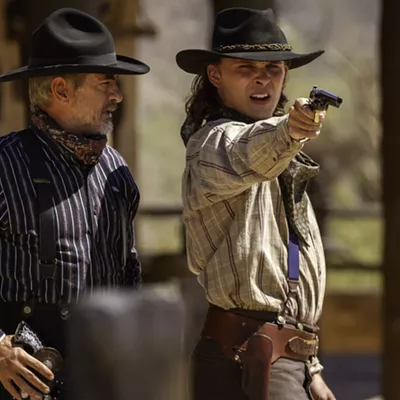In the opening show of the 50th anniversary season of the theater-that-almost-wasn't a few months ago, we are treated convincingly to the delight and weight and luminosity of what a really good theater can do and why our citizens came to the rescue of the Arizona Theatre Company when it announced it was on the brink of closing its operations.
King Charles III is the production, and if there are lingering doubts that this shop should not be allowed to shutter it's box-office once and for all, their production of Michael Bartlett's play convinces us otherwise.
It's a fantastical story of what might happen within and without England's royal family if ever Queen Elizabeth should take the stairway to heaven. That in itself causes us to reason that this is indeed a fantasy, for the Queen seems to keep on truckin' come what may.
But in Bartletts' play she has just assumed her position in whatever section of the afterlife is reserved for royals, and it's the Prince of Wales, a.k.a. Charles, after spending his entire life as an understudy, who is summoned to inhabit the role.
Charles, played endearingly and tragically by Peter Van Norden, does not have the grasp of being king quite yet, although he understands it intellectually and historically. He hasn't even yet been coronated when things take a turn, the result of which Charles feels is a call to edit the script written for royals.
Parliament, both houses, has passed a law that he sees as a challenge to the tenets of liberty, and he refuses to sign it. A signature was purely perfunctory; it had been the default setting for the monarchy for at least a century or two or three. Parliament decided the law of the land and the monarch would simply affix the royal seal as a formality. But Charles claims that the law limited freedom of the press. When the man who would be king declares his intention not to sign the law presented him, the entire population, including those who had created the bill and Charles' family and inner circle, gasp as one. Surely he knows that the monarch merely plays the part of richly clothed window dressing. Playwright Bartlett makes a nifty move here, leaving us to wonder whether Charles actually believes that the bill is wrong-headed or if he has succumbed to a long-dormant hubris feeding his resolve not to be silent.
What in God's United Kingdom has happened? Not only is the Queen, stalwart presence that she was, now absent, but her bland understudy of a son wants to actually intervene in the nitty-gritty of governance, ostensibly for the protection of the country and its citizens? Would he really dissolve the houses of Parliament so the law could not be enacted? Would he be party to the militarized chaos of his country, a tank outside the palace walls? Would he cut Harry free, at Harry's request, from his fate of royal birth?
Bartlett makes this both a comic and serious turn of events for the conflicted ruler, and for us as well—all in iambic pentameter. Yes, in an amazing move, he actually evokes the ways of Shakespeare, particularly his history plays, in content and language. Soliloquies, couplets, asides—they're all there, and we get to watch it play out with the royals as we have watched Shakespeare's feuding families.
And they are all there. Camilla (Cathy Dresbach); William (Adam Haas Hunter) and Kate (Kate Maher Hyland); and ginger-haired Harry (Dylan Saunders), all mixing it up with he who would be king. And you can't have a royal rumpus-causing event in the spirit of the Bard without a ghost wandering around the castle. Care to imagine who that might be?
Bartlett and his characters give us some wonderful comedic exchanges, and at first, at least, there is great dark fun with
the passing of the crown from one who knew how to lead to one who has waited his whole life for a smidgeon of power. But there are royally complex issues that arise as the story unfolds, both existential and political. The story played out on Bartlett's pages plays out in our psyches every day. Charles freely and determinedly gets into the magician's box of this historical moment, and swords are run through at all angles. If inside he somehow keeps from being lacerated and bled to death, he will surely find himself jailed within their blades in a conflict of his own making.
Director Matt August has envisioned a dark and delightful means of setting the story into motion and entrusts it to develop in the hands of his more than capable cast. Even though the blank verse might take a bit of getting used to, scenic designer G. W. Mercier and costume designer Kish Finnegan help anchor us visually until we do. The music and sound, designed by Brian Jerome Peterson, rocket the proceedings into ever-stranger dimensions. It's hard to imagine what our experience would be without the juice it provides the proceedings.
This is a first class production of a cheeky and thoughtful play. It's smart and sends us out of the theater having at once enjoyed the experience and immediately realizing that our experience is really far from over.







